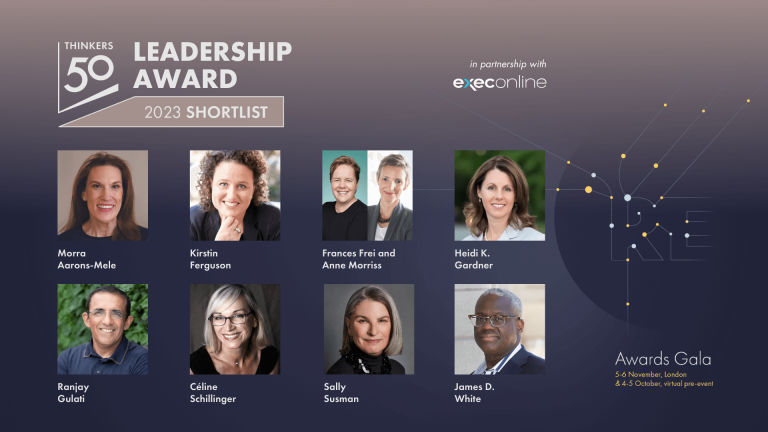

by Dave Ulrich
In the last 20 years, almost every public or private, large or small, domestic or global organization has crafted a set of values. These values often represent core beliefs and shape daily behaviors of leaders. They underlie a code of conduct and form the basis for an organization’s culture.
Some criticize and simultaneously praise values statements because they create or expose leadership hypocrisy where leaders actions do not reflect the stated values.
I want to suggest that the ultimate value of values is not just shaping leadership behavior, but shaping the right leadership behavior. The value of values starts by defining the value of values.
Value focuses outside; values come from within. Value emphasizes what others get from our efforts; values emphasize who we are. Value can be created and developed through innovation and hard work; values are generally inherited and may be honed through self-awareness and experience. Value can be measured by impact; values are measured by the strength of our character. Value derives from the worth of our work to stakeholders; values reflect the worth of our work to us.
There are three steps to fully creating value from values.
If value is defined by the receiver, it is helpful to know if an organization’s values resonate with top customers. We suggest that sales and marketing segment key customers who are high buyers of products and services sold by your organization , but low volume with your organization. Customer share which is the percent of customer purchase from the firm can mean more than overall market share since if focuses on which customers matter most. Then, it is helpful to ask these customers if your organization’s values matter to them? Generally, with values like innovation, collaboration, service, respect, the answer is “yes.” But, in one case the organization’s primary value was “to be the most profitable in the industry” and the customer quickly said this was not what mattered most to the customer. Customer value begins with them being part of defining desired values.
Rather than turn values into self-defined leadership behaviors, ask customers to operationalize the values. Too often desired leadership behaviors come from self-expectations. My favorite example comes from those who travel extensively. Imagine, late at night, you show up to a nice hotel in a foreign country. The bellman quickly grabs your bag from the cab and takes it into the hotel and to your room. Do you consider this a reflection of the value “good service?” I ask this question to many business leaders in workshops and about 20% agree, proactive bellmen immediately taking care of luggage means “good service” to them, but 80% consider this intrusive and not good service. They would rather carry their own bag to control it, to save time, or to not have to worry about a gratuity. This simplistic example can be expanded to target customers. When they thoughtfully participate in and operationalize the behaviors from the espoused values, they help you know what they expect from you. This dialogue helps become very specific about the value of values from a customer point of view.
Sometimes, operational executives see values discussions as soft and tangential to real business, but this question changes that perception. With the goal of customer share, customers can be directly asked what it would take to increase their share. And, customer share will quickly lead to sustained profitability. If their answer to this third question is “no”, then it is useful to start over at question 1 and define the values that matter most to them. If their answer is “yes”, then it is an opportunity to show customers a commitment to serve them.
Value statements make core believes more explicit. But when values become the basis of customer discussions and commitments, the value of values increases dramatically. When HR professionals partner with sales and market in these customer discussions, customer share may increase and sustainable value is created. This is an example of “outside in” work that defines effective organizations not just by what is done, but how it adds value to key stakeholders.
Dave Ulrich is the Rensis Likert Professor of Business at the University of Michigan, USA, and
Partner, the RBL Group.

Thinkers50 Limited
The Studio
Highfield Lane
Wargrave RG10 8PZ
United Kingdom

Thinkers50 Limited
The Studio
Highfield Lane
Wargrave RG10 8PZ
United Kingdom

| Cookie | Duration | Description |
|---|---|---|
| LANG | 9 hours | Linkedin set this cookie to set user's preferred language. |
| nsid | session | This cookie is set by the provider PayPal to enable the PayPal payment service in the website. |
| sp_landing | 1 day | The sp_landing is set by Spotify to implement audio content from Spotify on the website and also registers information on user interaction related to the audio content. |
| sp_t | 1 year | The sp_t cookie is set by Spotify to implement audio content from Spotify on the website and also registers information on user interaction related to the audio content. |
| tsrce | 3 days | PayPal sets this cookie to enable the PayPal payment service in the website. |
| x-pp-s | session | PayPal sets this cookie to process payments on the site. |
| __cf_bm | 30 minutes | This cookie, set by Cloudflare, is used to support Cloudflare Bot Management. |
| Cookie | Duration | Description |
|---|---|---|
| l7_az | 30 minutes | This cookie is necessary for the PayPal login-function on the website. |
| Cookie | Duration | Description |
|---|---|---|
| CONSENT | 2 years | YouTube sets this cookie via embedded youtube-videos and registers anonymous statistical data. |
| _ga | 2 years | The _ga cookie, installed by Google Analytics, calculates visitor, session and campaign data and also keeps track of site usage for the site's analytics report. The cookie stores information anonymously and assigns a randomly generated number to recognize unique visitors. |
| _gat_gtag_UA_10408481_1 | 1 minute | Set by Google to distinguish users. |
| _ga_ZP8HQ8RZXS | 2 years | This cookie is installed by Google Analytics. |
| _gid | 1 day | Installed by Google Analytics, _gid cookie stores information on how visitors use a website, while also creating an analytics report of the website's performance. Some of the data that are collected include the number of visitors, their source, and the pages they visit anonymously. |
| Cookie | Duration | Description |
|---|---|---|
| NID | 6 months | NID cookie, set by Google, is used for advertising purposes; to limit the number of times the user sees an ad, to mute unwanted ads, and to measure the effectiveness of ads. |
| test_cookie | 15 minutes | The test_cookie is set by doubleclick.net and is used to determine if the user's browser supports cookies. |
| VISITOR_INFO1_LIVE | 5 months 27 days | A cookie set by YouTube to measure bandwidth that determines whether the user gets the new or old player interface. |
| YSC | session | YSC cookie is set by Youtube and is used to track the views of embedded videos on Youtube pages. |
| yt-remote-connected-devices | never | YouTube sets this cookie to store the video preferences of the user using embedded YouTube video. |
| yt-remote-device-id | never | YouTube sets this cookie to store the video preferences of the user using embedded YouTube video. |
| yt.innertube::nextId | never | This cookie, set by YouTube, registers a unique ID to store data on what videos from YouTube the user has seen. |
| yt.innertube::requests | never | This cookie, set by YouTube, registers a unique ID to store data on what videos from YouTube the user has seen. |
| Cookie | Duration | Description |
|---|---|---|
| DEVICE_INFO | 5 months 27 days | No description |
| loglevel | never | No description available. |
| m | 2 years | No description available. |
Thinkers50 Limited has updated its Privacy Policy on 28 March 2024 with several amendments and additions to the previous version, to fully incorporate to the text information required by current applicable date protection regulation. Processing of the personal data of Thinkers50’s customers, potential customers and other stakeholders has not been changed essentially, but the texts have been clarified and amended to give more detailed information of the processing activities.